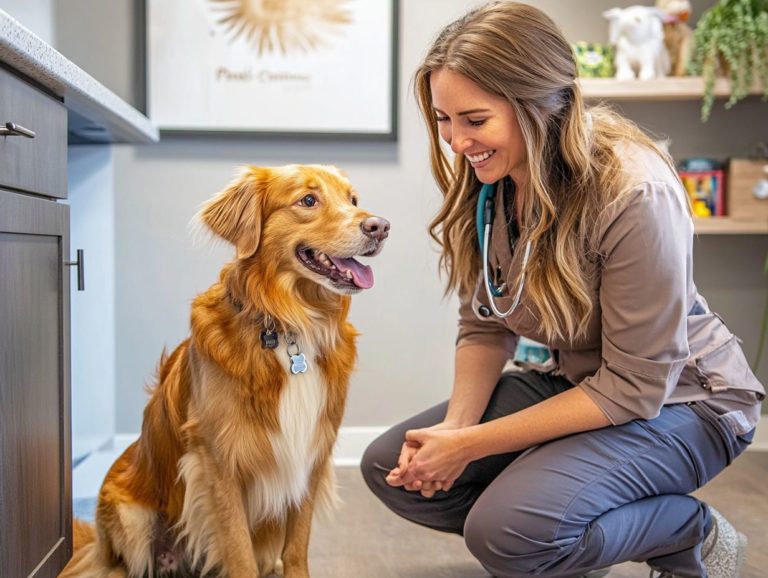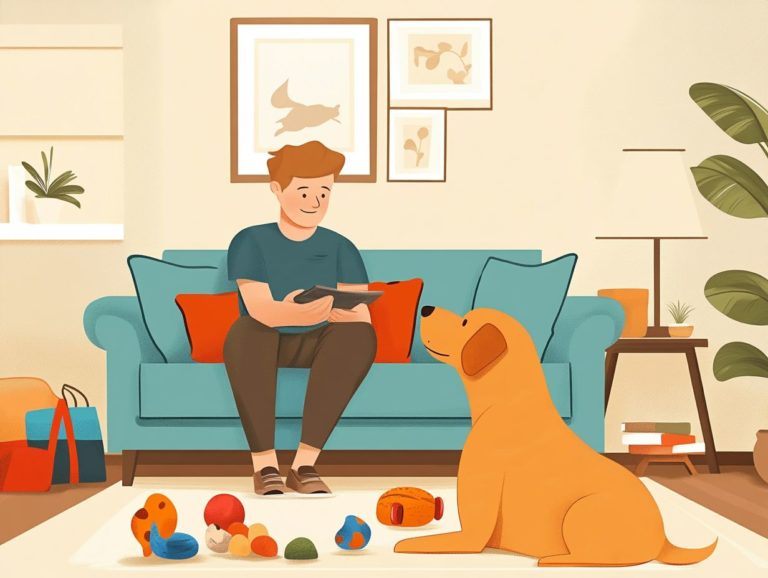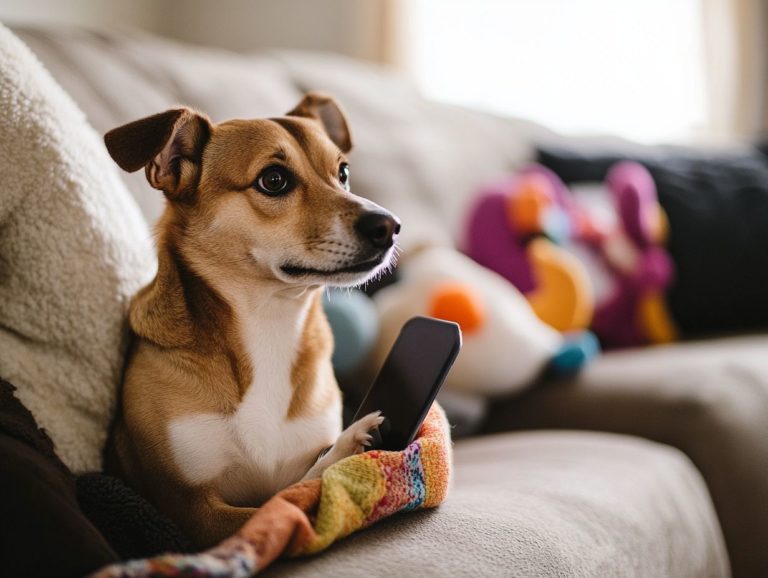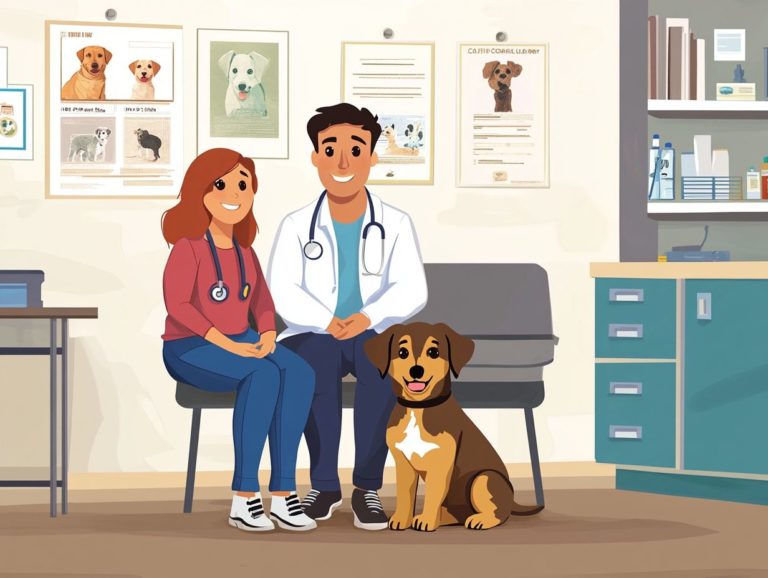The Importance of Professional Guidance in Pet Anxiety
Pet anxiety is becoming an increasingly pressing concern for many pet owners, affecting the well-being of both your furry friends and yourself.
Understanding the causes and symptoms of this condition, commonly referred to as dog anxiety, is vital for managing it effectively. This article delves into the various ways anxiety can influence your pet s behavior and overall quality of life. It underscores the importance of seeking professional guidance and outlines the diverse treatment options available.
You’ll also discover practical tips for making your home a calming place for your pet. Let s explore this important topic together and give your pets the comfort they deserve!
Contents
- Key Takeaways:
- Understanding Pet Anxiety
- The Impact of Pet Anxiety on Pets and Owners
- The Role of Professional Guidance
- Treatment Options for Pet Anxiety
- Tips for Managing Pet Anxiety at Home
- Your Pet Anxiety Questions Answered!
- What is pet anxiety and why is it important to address?
- How can professional guidance help in managing pet anxiety?
- What are some signs that my pet may be experiencing anxiety?
- Can pet anxiety be cured?
- Is professional guidance only necessary for severe cases of pet anxiety?
- How can I find a reputable professional to help with my pet’s anxiety?
Key Takeaways:
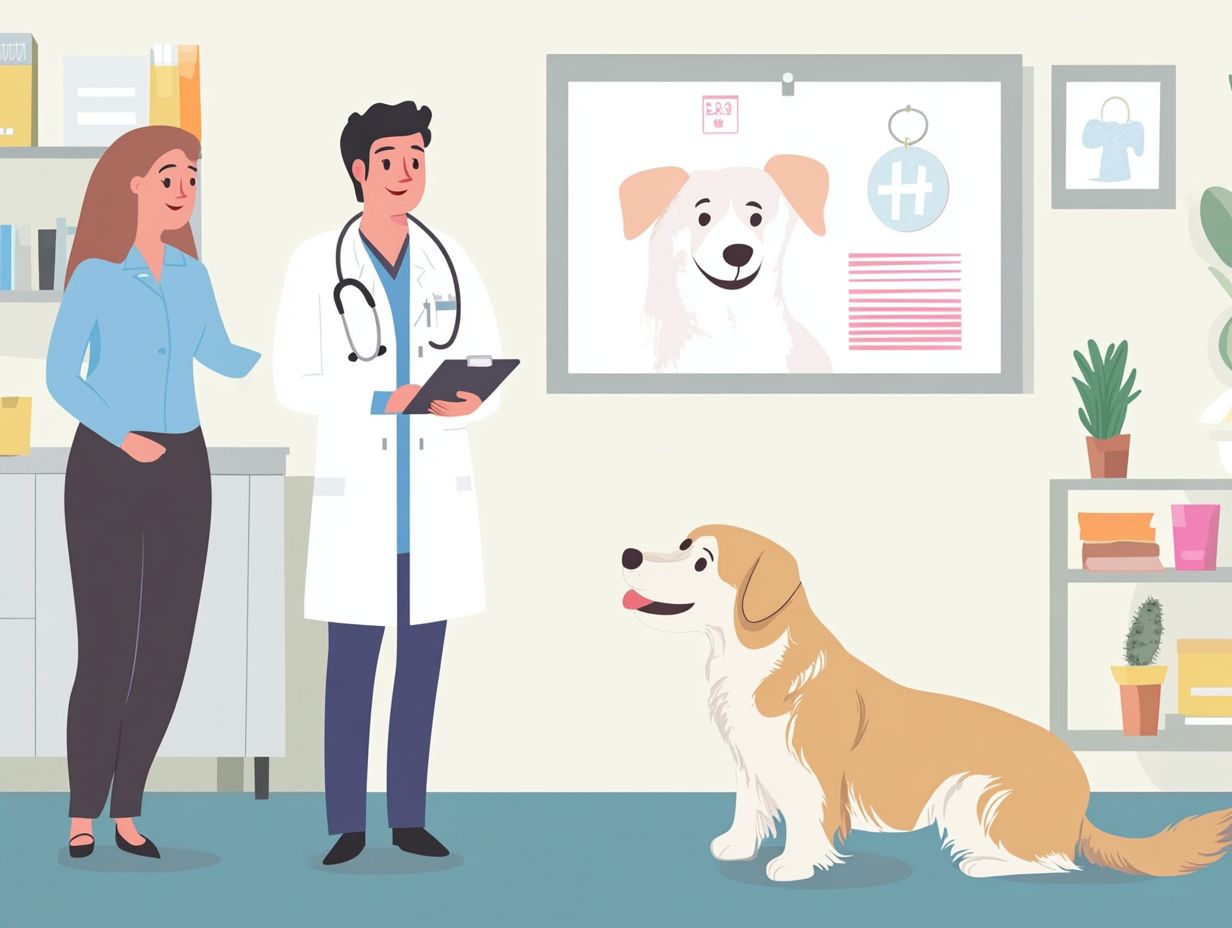
- Pet anxiety can manifest in various ways and can significantly impact both the pet’s behavior and the owner’s quality of life.
- Seeking professional guidance can greatly benefit pets with anxiety, and there are various types of professionals that can provide effective support and treatment.
- In addition to professional help, creating a calming environment with physical exercise, mental stimulation, and establishing a routine at home can also help manage dog anxiety.
Understanding Pet Anxiety
Understanding pet anxiety is essential for you as a dog owner if you want to enhance your dog’s emotional well-being and overall quality of life, especially considering the role of family in pet anxiety consultations.
Canine anxiety can take many forms, including separation anxiety, which often surfaces in response to environmental changes or loud noises, like thunderstorms and fireworks. Recognizing the signs and symptoms of anxiety is key to managing it effectively. By interpreting their behaviors and actions, you can take proactive measures to provide your furry companion with the support necessary for them to truly thrive.
Causes and Symptoms
The causes and symptoms of dog anxiety can differ significantly from one breed to another and even among individual dogs. Factors like breeding history, environment, and past experiences shape these differences. Common anxiety triggers include loud noises, changes in routine, and insufficient strategies for enhancing social interaction.
Certain breeds, such as Beagles, Retrievers, Border Collies, German Shepherds, and Rottweilers, may display heightened anxiety levels due to inherited traits. For example, the herding instinct refers to behaviors that help dogs manage livestock, which can make them more vulnerable to stressors in their environment. Symptoms of anxiety may manifest as excessive chewing on furniture, digging, or even pacing around the house, leaving you wondering how to ease your furry companion s distress.
Understanding the underlying causes of anxiety is crucial for you as a pet owner. This awareness allows you to implement effective strategies that help your dog feel safe and secure.
The Impact of Pet Anxiety on Pets and Owners
The impact of canine anxiety on both you and your furry companion can be profound, influencing emotional well-being, daily routines, and overall quality of life. As a dog owner, watching your pet grapple with anxiety can evoke feelings of frustration and helplessness, forcing you to make adjustments in your own life to meet their needs.
This emotional strain makes it harder to manage stress. Effective strategies should focus on social interaction and training for both you and your pet.
Effects on Behavior and Quality of Life
The effects of pet anxiety on behavior and quality of life are strong, often revealing themselves through various behavioral issues that can sap a dog s overall happiness and well-being. You may notice symptoms like excessive barking, destructive tendencies, and withdrawal. These issues can severely disrupt their ability to engage in everyday activities, including social interactions and mental stimulation.
This can lead to a further decline in their quality of life, particularly in cases of separation anxiety. Pet anxiety can lead to a cycle of fear and discomfort, creating a stressful environment that stifles their natural instincts and social skills. You must address these concerns.
Implementing mental stimulation through interactive toys and training exercises can provide much-needed relief through interactive play and training sessions, while positive reinforcement helps cultivate a sense of security and confidence.
By incorporating these strategies, you can significantly elevate your dog’s emotional state, fostering a harmonious living situation that encourages playfulness and nurtures a fulfilling life.
The Role of Professional Guidance
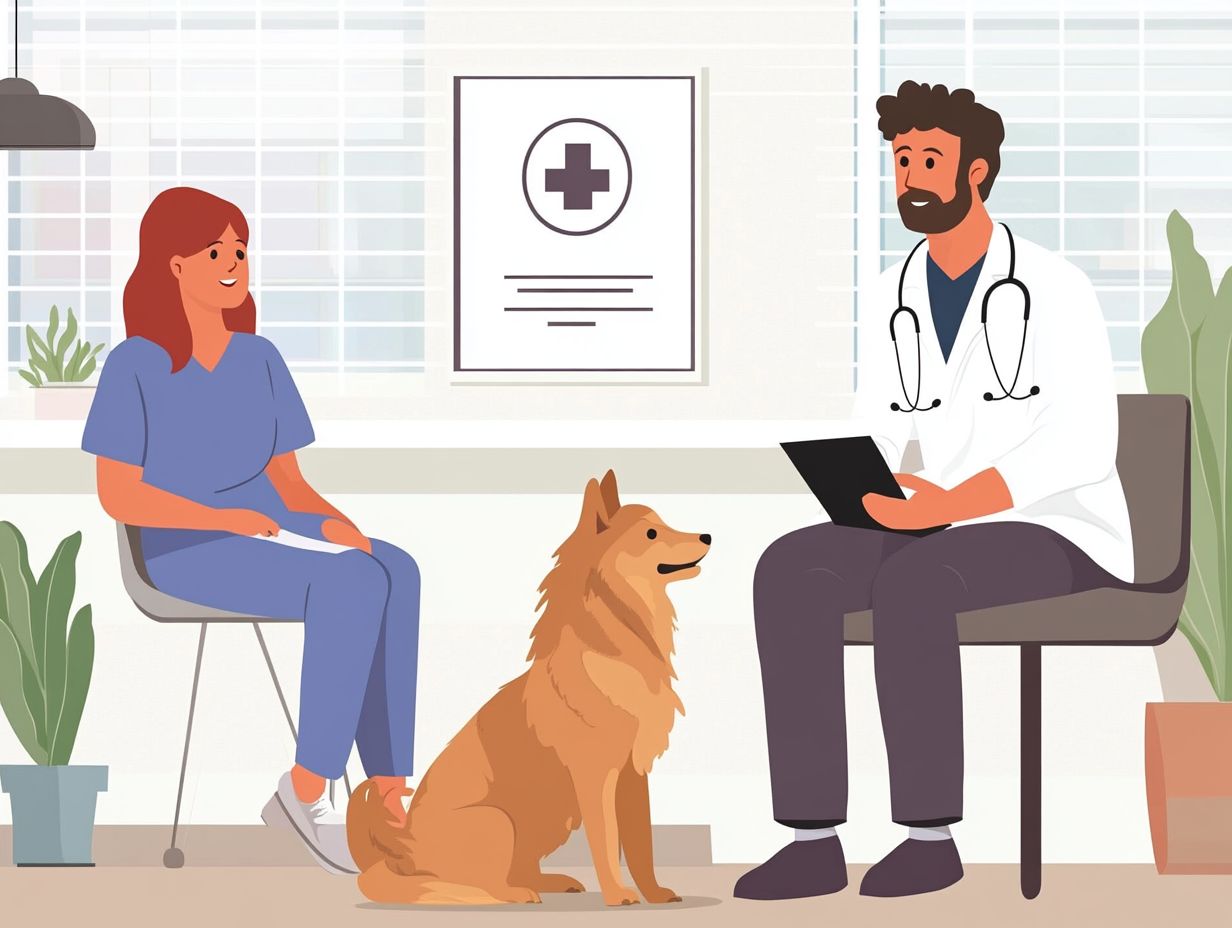
The role of professional guidance in managing dog anxiety is truly invaluable for pet owners who wish to enhance their dogs’ emotional well-being and effectively address behavioral issues. By reaching out to qualified pet care professionals, such as veterinarians, animal behaviorists, and dog trainers, you can craft personalized anxiety management strategies tailored to your pet’s unique needs, including understanding the role of veterinary advice in managing pet anxiety.
These experts offer insights into effective behavioral training, products that help calm your dog, such as pheromone diffusers and anxiety wraps, as well as methods to help your dog get used to things that make them anxious. This support can help alleviate anxiety symptoms, ultimately fostering a more harmonious environment for both you and your furry companion.
Benefits of Seeking Professional Help
Seeking professional help for your dog’s anxiety can transform your dog’s life! It offers a wealth of benefits, including tailored strategies for dog owners that lead to marked improvements in your dog’s overall well-being. Professionals can guide you in recognizing signs and symptoms of pet anxiety and help you develop effective behavioral training methods that employ positive reinforcement, calming aids, and strategies for social interaction.
These experts will assess the unique triggers and behaviors that contribute to your dog’s anxiety, ensuring that each approach is customized to meet specific needs. By incorporating calming aids like pheromone diffusers or anxiety wraps, the effectiveness of the training is heightened.
This personalized methodology fosters a deeper understanding between you and your dog, enriching your bond through shared experiences and intentional communication.
Don’t wait! Seek help today to improve your dog’s emotional health. Ultimately, the aim is not just to manage anxiety but to empower you with the tools and confidence needed to support your four-legged companion as they navigate a more relaxed and fulfilling life.
Types of Professionals Who Can Help
You’ll find that various pet care professionals can be instrumental in helping you manage your dog’s anxiety, ranging from veterinarians to animal behaviorists and specialized pet care experts. Notably, pet trainers play a key role in addressing canine anxiety, offering insights into effective stress management techniques.
Start your journey with a visit to your veterinarian, who will rule out any medical issues that might be contributing to your dog’s anxiety or environmental changes. Once any underlying health concerns are addressed, animal behaviorists can assess your dog’s specific triggers and develop personalized behavior modification plans that cater to their unique situation.
For further support, dog trainers who specialize in anxiety relief can implement positive reinforcement strategies that not only boost your dog’s confidence but also help reduce their stress levels. To better understand the financial aspect of seeking help, you might want to check out understanding the cost of pet anxiety experts. Additionally, pet care professionals like groomers and pet sitters can provide daily support in anxiety management, ensuring your dog feels secure in a variety of environments.
By collaborating, these experts create a comprehensive approach to address your dog’s emotional well-being, allowing you both to navigate this journey with confidence.
Treatment Options for Pet Anxiety
Treatment options for pet anxiety offer a diverse array of methods, from behavioral therapy to medications and calming products, all crafted to meet the distinct needs of anxious dogs.
To effectively manage anxiety, you may consider a tailored plan that combines these approaches, specifically designed to address the severity and unique triggers of your dog’s anxiety symptoms.
Behavioral Therapy
Behavioral therapy treats dog anxiety by focusing on gradual exposure methods and positive reinforcement approaches. This therapeutic approach gives you the power to cultivate a supportive environment that promotes emotional well-being while tackling behavioral challenges.
By gradually exposing your dog to specific stimuli that trigger their anxiety, you enable them to grow more comfortable over time. Gradual exposure involves carefully controlled interactions with these triggers, helping your dog reduce its fearful responses. When paired with positive reinforcement rewarding desirable behaviors with treats or praise you foster a sense of safety that encourages your dog to reveal its true personality.
These strategies not only alleviate anxiety symptoms but also enhance your dog s overall emotional health, preparing them to interact positively with their surroundings and the people in their lives.
Medications and Supplements
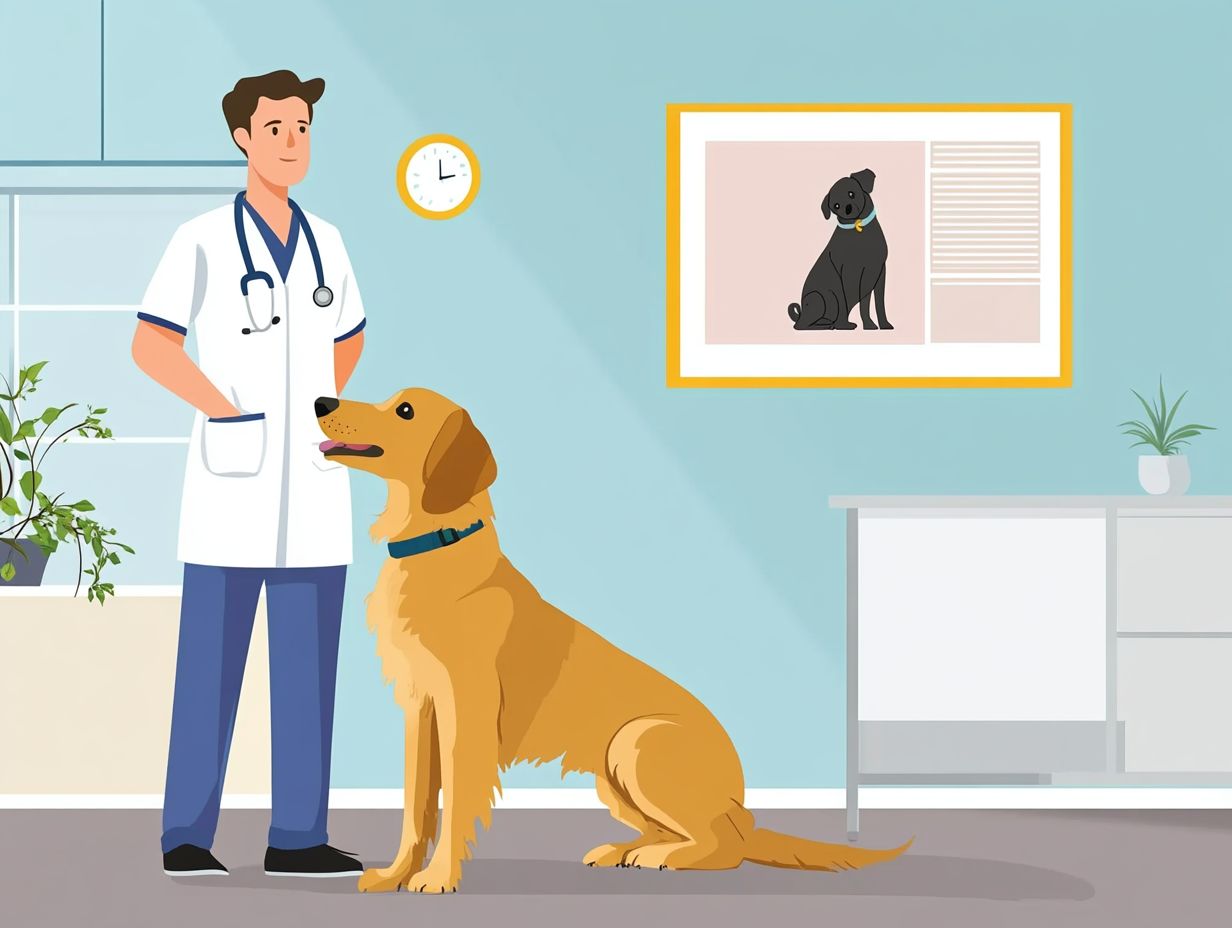
Medications and supplements can be effective calming aids for dogs grappling with severe anxiety symptoms, providing you with additional tools for managing their distress. Don t wait! Consult your veterinarian today to find the right solution for your dog s anxiety.
Common therapeutic options often include prescription medications like selective serotonin reuptake inhibitors (SSRIs) or natural supplements such as hemp oils and calming chews. These interventions can significantly ease symptoms triggered by stressful situations, whether it s thunderstorms or loud noises, allowing your dog to feel more at ease.
As a caregiver, it’s crucial to recognize that while some products may advertise quick fixes, not every solution fits every dog. This is where veterinarians become invaluable, assessing your pet’s unique needs and guiding you toward safe and effective anxiety treatments. Understanding what makes a great pet anxiety specialist can further enhance your approach to supporting their overall mental health.
Tips for Managing Pet Anxiety at Home
Managing pet anxiety at home can greatly improve your dog’s emotional well-being. By cultivating a serene environment and establishing a consistent routine, you create the perfect backdrop for your furry friend s peace of mind.
Regular physical exercise, mental stimulation, and interactive play are essential tools in your arsenal. These activities help alleviate anxiety symptoms, fostering a supportive and nurturing atmosphere for both you and your beloved pet.
Creating a Calming Environment
Creating a calming environment is essential for managing your dog’s anxiety. It s all about providing the emotional support they need to alleviate stress and foster a sense of security. Incorporating calming products like pheromone diffusers and soothing music can significantly enhance your dog’s comfort and help address signs of pet anxiety.
Along with these products, establishing a consistent routine greatly benefits their emotional well-being. It allows your furry friend to anticipate daily activities with ease. Creating a designated safe space where they can retreat also contributes to their feelings of safety.
Engaging them with interactive toys toys that engage your dog mentally and gentle physical activities promotes mental stimulation, which is equally important in mitigating anxiety.
You ll often find that a thoughtful combination of these elements creates a tranquil atmosphere. This makes it easier for your dog to relax and feel secure, effectively reducing symptoms of stress!
Establishing a Routine
Establishing a routine is essential for managing your dog’s anxiety. It provides the structure and predictability they need to soothe anxious pups and enhance their emotional well-being.
By incorporating regular training sessions, physical exercise, and social interaction into your dog’s day, you create a balanced routine that promotes mental stimulation and minimizes anxiety triggers.
Integrating daily walks into your schedule not only offers vital physical exercise but also gives your dog the opportunity to explore their environment this can significantly reduce stress levels.
Focused training sessions nurture a sense of accomplishment and purpose. This helps your dog feel more secure and less anxious.
Facilitating interactions with other pets and people encourages healthy socialization, breaking down feelings of isolation and fear. Ultimately, a carefully crafted routine gives the power to your dog to thrive both emotionally and mentally, leading to a happier, more balanced life!
Your Pet Anxiety Questions Answered!
What is pet anxiety and why is it important to address?
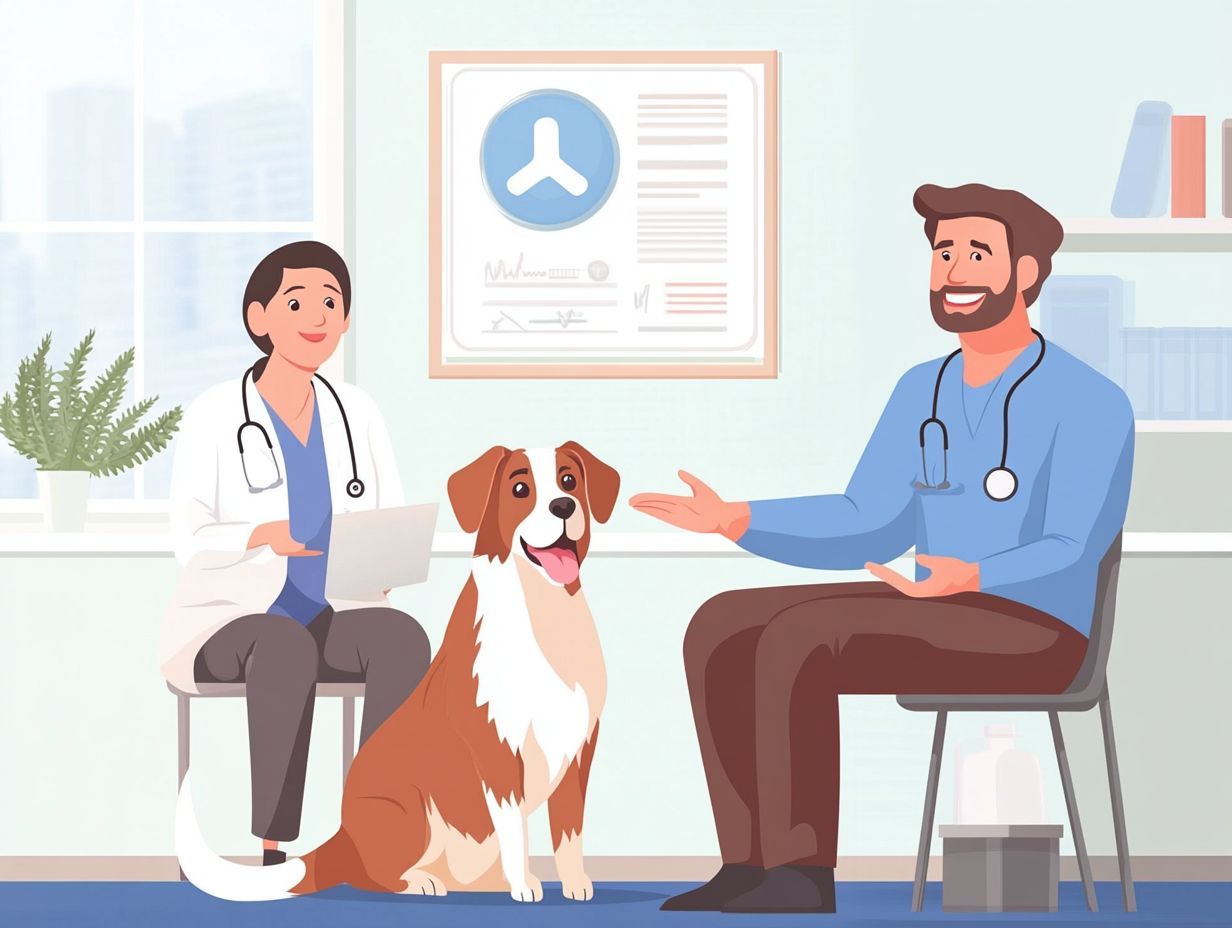
Pet anxiety refers to a state of distress or fear experienced by animals, often triggered by certain situations or events. It’s important to address this because it can greatly impact the well-being and behavior of our pets and can even lead to health issues if left unmanaged.
How can professional guidance help in managing pet anxiety?
Professional guidance from a veterinarian or animal behaviorist provides valuable insights and expertise in understanding and addressing pet anxiety. Knowing when to consult a professional for pet anxiety can help ensure they receive personalized treatment plans and techniques to ease their anxiety and improve their overall quality of life.
What are some signs that my pet may be experiencing anxiety?
Signs of pet anxiety can vary, but common indicators include excessive barking or meowing, destructive behavior, shaking or trembling, loss of appetite, and avoidance of certain situations or people. It’s important to pay attention to any changes in your pet’s behavior and consult with a professional if you suspect anxiety.
Can pet anxiety be cured?
While there is no one-size-fits-all cure for pet anxiety, it can be managed and greatly improved with the help of professional guidance. Understanding the influence of environment on pet anxiety is crucial. With the right treatment and support, your pet can learn to cope with their anxiety and live a happy, stress-free life.
Is professional guidance only necessary for severe cases of pet anxiety?
No, professional guidance can be beneficial for any level of pet anxiety. Even if your pet’s anxiety seems mild, seeking veterinary professionals can prevent it from escalating and improve their overall well-being.
How can I find a reputable professional to help with my pet’s anxiety?
You can start by asking for recommendations from your veterinarian or trusted friends and family members who have experience with pet anxiety. It’s also important to research and read reviews of potential professionals to ensure they are qualified and have a good track record in understanding different types of pet anxiety experts.
If you notice signs of anxiety in your pet, don t hesitate to seek help!


